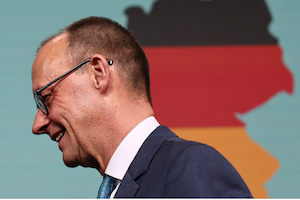Germany's New Chancellor Faces Doubt: 56% Lack Confidence in Merz

According to recent reports from multiple media outlets, Germany's incoming Chancellor Friedrich Merz is facing a serious challenge in public opinion. The latest polls indicate that between 56% and 60% of German voters lack confidence in his leadership abilities, a figure that has also raised concern within his own party, the Christian Democratic Union (CDU).
Merz’s CDU/CSU alliance won the federal election on February 23, 2025, with 28.5% of the vote and is expected to take office officially on May 6. In order to form a government, he reached a grand coalition agreement with the Social Democratic Party (SPD), covering reforms such as tax cuts, defense investment, and immigration policy. However, the agreement has been met with controversy within the SPD, with only 56% of party members participating in the ratification vote—reflecting a lack of enthusiasm at the grassroots level.
Public skepticism toward Merz centers largely on his shift in stance regarding fiscal discipline. While he previously advocated for strict budgetary control, during coalition talks he proposed a €1 trillion public investment plan—an initiative critics say contradicts his conservative image. Furthermore, his hardline approach to immigration has sparked controversy, particularly his support for a restrictive immigration proposal backed by the far-right Alternative for Germany (AfD), breaking a long-standing political taboo against cooperation with extremist parties.
On foreign policy, Merz has called for Europe to enhance its independent defense capabilities and reduce reliance on the United States, even questioning whether NATO's current structure remains suitable for today's security landscape. His position has stirred debate both domestically and abroad.
Meanwhile, support for the far-right AfD has surged, with the party surpassing the CDU in national polls for the first time to become Germany’s most popular political force. This trend highlights growing voter dissatisfaction with traditional parties and presents an additional challenge to the Merz administration.
Overall, Merz is stepping into a role fraught with both political and economic pressure. Domestically, he must navigate ideological divides between conservatives and centrists within his coalition. Internationally, he will need to respond to shifts in U.S. policy and their implications for European security. His leadership will face a critical test in the coming months.
- 159 reads
Human Rights
Fostering a More Humane World: The 28th Eurasian Economic Summi

Conscience, Hope, and Action: Keys to Global Peace and Sustainability

Ringing FOWPAL’s Peace Bell for the World:Nobel Peace Prize Laureates’ Visions and Actions

Protecting the World’s Cultural Diversity for a Sustainable Future

Puppet Show I International Friendship Day 2020

